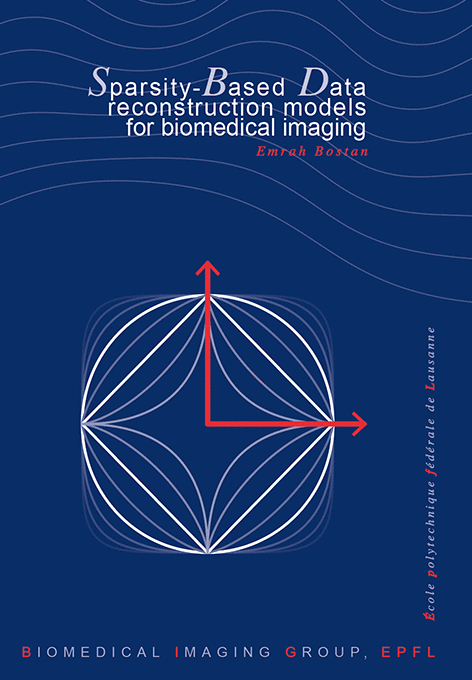Sparsity-Based Data Reconstruction Models for Biomedical Imaging
E. Bostan
École polytechnique fédérale de Lausanne, EPFL Thesis no. 6974 (2016), 191 p., May 20, 2016.
We propose new regularization models to solve inverse problems encountered in biomedical imaging applications. In formulating mathematical schemes, we base our approach on the sparse signal processing principles that have emerged as a central paradigm in the field. We adopt a variational perspective and specify the proposed sparsity-promoting data reconstruction models as energy minimization problems. To design practical algorithms, we develop novel iterative methods to efficiently perform the consequent optimization task.
The thesis is organized in three main parts. In the first part, our main contribution is the introduction of a proper statistically-based discretization paradigm for inverse problems. In particular, our framework considers a continuous-domain stochastic signal model and characterizes a specific class of inference algorithms. We show that derived inference-based methods cover the classical Tikhonov-type techniques as well as a wide range of the sparsity-promoting schemes including the well-known ℓ1-norm regularization and its nonconvex variants. This provides a unifying stochastic perception of the resolution of inverse problems.
In the second part, we propose a novel phase retrieval algorithm for imaging unstained biological samples that are optically thin. In specific terms, we use the transport-of-intensity equation (TIE) relating the spatial phase map of a field to the derivative of its intensity along the propagation direction. We analyze the implications of using the TIE formalism with finer and coarser approximations of said derivative. Based on this analysis, our contribution is a practical phase reconstruction algorithm that incorporates a sparsity-based regularization. The developed technique operates with a standard bright-field microscope. Experiments on real data illustrate that our phase reconstruction algorithm is viable and can be a low-cost alternative to dedicated phase microscopes.
In the last part, we develop regularization schemes for vector fields, which have an increasing prevalence in medical imaging. In this context, our first contribution is a new regularizer that imposes sparsity on the singular values of the Jacobian of a given vector field. We show that the proposed regularization functional is a valid extension of total variation (TV) regularization to vector-valued functions. We utilize the developed framework for enhancing the streamline visualizations of experimentally acquired 4D flow MRI data. Since vector field regularization requires processing large volumes of multidimensional data, our second contribution is the development of a non-iterative denoising algorithm. In particular, we design model-based tight wavelet frames that are able to remove the spurious divergence content from the vector field, which is of interest in aortic blood flow imaging.

@PHDTHESIS(http://bigwww.epfl.ch/publications/bostan1602.html,
AUTHOR="Bostan, E.",
TITLE="Sparsity-Based Data Reconstruction Models for Biomedical
Imaging",
SCHOOL="{\'{E}}cole polytechnique f{\'{e}}d{\'{e}}rale de {L}ausanne
({EPFL})",
YEAR="2016",
type="{EPFL} Thesis no.\ 6974 (2016), 191 p.",
address="",
month="May 20,",
note="")